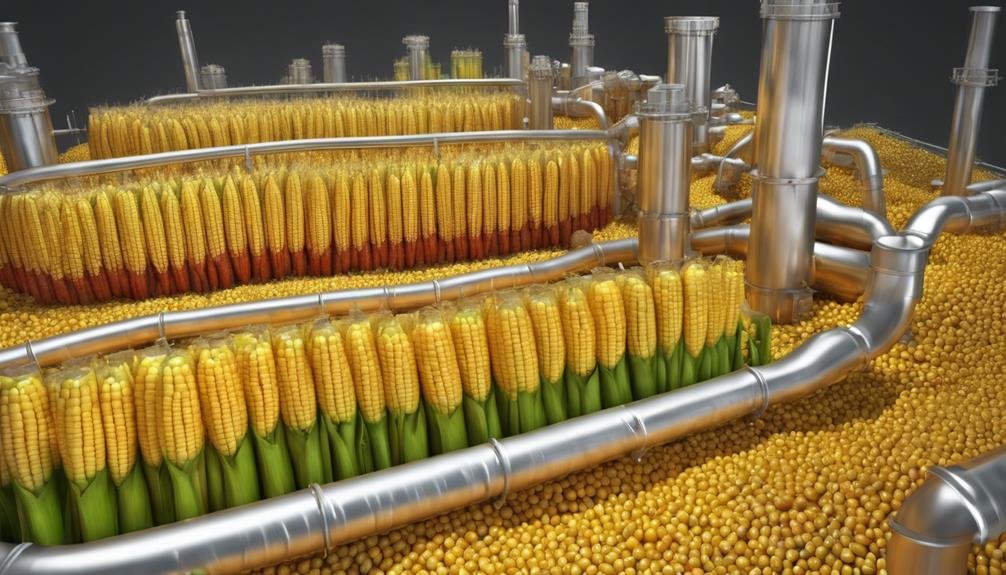Biofuel: Definitions, Examples, and Limitations
Biofuels are renewable alternatives to fossil fuels, including ethanol, biodiesel, and biogas. They exist in solid, liquid, and gaseous forms, with examples like corn ethanol. Major oil companies invest in advanced biofuel research. Algae biofuels, like algae production on non-arable land, offer sustainable alternatives to conventional fuels. While biofuels reduce reliance on nonrenewable resources, they may have lower energy efficiency and environmental impacts. This outlines the complexities of biofuels as energy sources and hints at the importance of understanding both their benefits and limitations for a more sustainable future.
Key Takeaways
- Biofuels are renewable alternatives to fossil fuels.
- Algae biofuels offer sustainable energy solutions.
- Concerns exist about the environmental impact of biofuel production.
- Biofuels reduce strain on nonrenewable resources.
- Limitations include lower energy efficiency and land use issues.
What Is Biofuel?
Biofuel is the cornerstone of sustainability in the domain of energy production, derived from living materials to provide a renewable alternative to traditional fossil fuels. This form of renewable energy includes ethanol, biodiesel, green diesel, and biogas, which can be in solid, liquid, or gaseous states.
Corn ethanol and biodiesel are prevalent examples of biofuels that are easier to transport and burn cleanly in liquid or gaseous form. As the world seeks sustainable solutions to meet increasing energy demands, biofuels play a crucial role in reducing dependence on nonrenewable resources.
Major oil companies are actively investing in advanced biofuel research, with ExxonMobil alone contributing over $300 million towards this endeavor. Biofuels are essential for a sustainable energy future and offer a promising alternative to conventional fossil fuels.
Examples of Biofuels
Several distinct types of biofuels are prominent in the renewable energy sector, showcasing the diverse range of alternatives to traditional fossil fuels.
Algae production is a notable example of a biofuel source that has gained attention for its potential to yield higher biofuel volumes per acre compared to conventional crops. Algae can be cultivated on non-arable land, using non-freshwater resources, making it a sustainable alternative in the domain of renewable energy sources.
This innovative approach to biofuel production offers a promising solution to reduce dependence on nonrenewable resources while addressing concerns about land use issues like erosion and deforestation. Algae biofuels have the potential to replace conventional gasoline and diesel, contributing to a more sustainable energy future.
Key Takeaways on Biofuels
Amidst the growing exploration of diverse biofuel alternatives, it is imperative to highlight key takeaways that underscore the significance of renewable energy sources in addressing global sustainability challenges.
Biofuels, such as corn ethanol and biodiesel, play a vital role in renewable energy and sustainability efforts by reducing reliance on nonrenewable resources. These biofuels burn cleanly, putting less strain on fossil fuels and aiding in the shift towards more sustainable energy solutions.
Biogas, another common biofuel derived from organic byproducts, further exemplifies the potential of renewable energy sources in mitigating environmental impacts.
Embracing biofuels not only diversifies the energy mix but also contributes to the ongoing global efforts to achieve a more sustainable and environmentally friendly future.
Understanding Biofuel Importance
With the escalating global demand for energy and the imperative shift towards sustainable solutions, the significance of understanding the importance of biofuel in the energy landscape cannot be overstated. Biofuels play a pivotal role in providing renewable energy sources that are essential for future sustainability.
Unlike fossil fuels, biofuels are derived from organic materials and can be continually replenished, reducing the strain on nonrenewable resources. Major oil companies are recognizing the importance of biofuels and are investing heavily in advanced research to enhance their efficiency and production.
For instance, ExxonMobil has allocated over $300 million towards biofuel research, highlighting the growing recognition of biofuels as a key component in the transformation towards a more sustainable energy future.
Limitations of Biofuel
In light of the growing emphasis on biofuels as a sustainable energy source, it is important to recognize the limitations associated with their production and utilization.
One significant limitation of biofuels is their energy efficiency compared to traditional fossil fuels. The production of biofuels, especially ethanol, often requires more energy input than the energy output achieved through their combustion. This inefficiency raises concerns about the overall environmental impact of biofuel production. Critics argue that the energy-intensive processes involved in biofuel production can counteract the environmental benefits they are intended to provide.
Additionally, the cultivation of biofuel crops can lead to land use issues such as deforestation and soil erosion, further highlighting the complexities and limitations of biofuel as an alternative energy source.
Conclusion
To sum up, while biofuels offer a promising alternative to traditional fossil fuels, their limitations and challenges must be carefully considered in the shift towards cleaner energy sources.
The complexities of biofuel production and potential impacts on food prices and land use highlight the need for further research and innovation in this field.
Despite their potential, biofuels are not a perfect solution and require careful management to guarantee their sustainability in addressing global energy demands.







